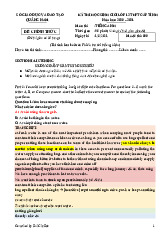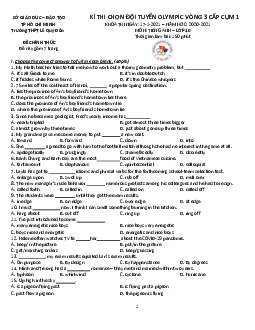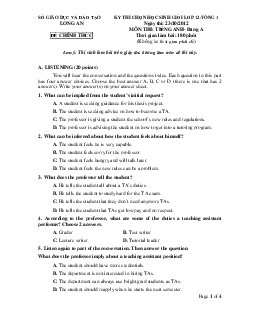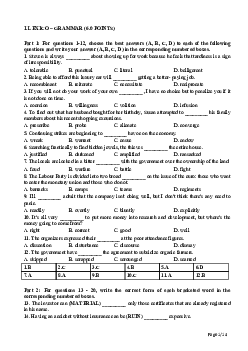





Preview text:
SỞ GIÁO DỤC VÀ ĐÀO TẠO
KỲ THI CHỌN ĐỘI TUYỂN KHÁNH HÒA
THI HSG THPT CẤP QUỐC GIA NĂM 2020
HƯỚNG DẪN CHẤM
Môn thi: TIẾNG ANH ĐỀ CHÍ NH THỨC
(Hướng dẫn chấm có 06 trang)
I. LISTENING (50 points) 2 pts. x 25 = 50 pts. Part 1 1. Roger Brown 2. PE9 7QT
3. (a) student, (and) (a) waiter
4. politics (,) (and) history
5. disabled young people Part 2 6. F 7. A 8. D 9. E 10. B Part 3 11. C 12. B 13. C 14. D 15. B Part 4
16. third woman scientist
21. stretched and amplified 17. inspired 22. mentor
18. electro-optics 23. PhD student
19. chirped pulse amplification
24. 1.3 million dollars
20. vision correction surgery 25. laureate
II. LEXICO-GRAMMAR (20 points) 1 pt. x 20 = 20 pts. Part 1 26. B 27. A 28. A 29. D 30. C 31. C 32. D 33. B 34. D 35. C 36. B 37. A 38. B 39. C Part 2 40. irrepressible 41. rediscovered 42. imbalance 43. hormonal 44. uplifting 45. psychosomatic
III. READING (50 points) 1 pt. x 50 = 50 pts. Part 1
46. damaged/broken 47. get 48. going
49. superstitious 50. notice
51. junction/intersection 52. least
53. unfortunate/unlucky 54. shaken 55. work Part 2 56. iv 57. viii 58. vii 59. iii 60. i 61. x 62. v 63. F 64. T 65. NG 66. T Part 3 67. G 68. C 69. F 70. B 71. A 72. E Part 4 73. A 74. C 75. D 76. B 77. B 78. A 79. B T r a n g 1 | 6 Part 5 80. A 84. B 88. E 92. A 81. B 85. C 89. D 93. E 82. D 86. B 90. A 94. D 83. D 87. A 91. B 95. C IV. WRITING (60 points) Part 1. (15 points) Contents (10 points)
- The summary MUST cover the following points:
confusion / mixing of smells
smells that are difficult to get rid of (when you want to)
some smells are unpleasant
nowadays, perfume companies can produce any kind of smell
many new perfumes are very strange OR strange-smelling perfumes are now common
- The summary MUST NOT contain personal opinions.
Language use (5 points) The summary should:
- show attempts to convey the main ideas of the original text by means of paraphrasing (structural and lexical use),
- demonstrate correct use of grammatical structures, vocabulary, & mechanics (spelling, punctuations,...),
- maintain coherence cohesion, and unity throughout (by means of linkers and transitional devices). Penalties
- A penalty of 1 point to 2 points will be given to personal opinions found in the summary.
- A penalty of 1 point to 2 points will be given to any summary with more than 30% of words copied from the original.
- A penalty of 1 point will be given to any summary longer than 130 words or shorter than 90 words. Part 2. (15 points) Contents (10 points)
- The report MUST cover the following points:
Introduce the charts (2 points) and state the striking features (2 points)
Describe main features with relevant data from the charts and make relevant comparisons (6 points)
- The report MUST NOT contain personal opinions. (A penalty of 1 point to 2 points will be given to personal
opinions found in the answer.)
Language use (5 points) The report should:
- demonstrate a wide variety of lexical and grammatical structures,
- have correct use of words (verb tenses, word forms, voice,...); and mechanics (spelling punctuations,...). Model Answer
These two graphs present information about sales in pounds sterling of three different kinds of music. Taken
together, the graphs cover five decades, from the 1960s to 2003. The graphs show that the popularity of pop
music, classical music and rock has changed dramatically over the years.
In the 1960s, classical music was by far the most popular type of music, yet throughout the following decades
its popularity steadily declined. The top graph indicates that, as an exception, classical music sales increased by
almost a billion pounds in 2002 before falling again to the previous low in the following year.
In contrast, the popularity of pop music has had a constant and dramatic upward trajectory from the 1960s to
the 1990s. This trajectory is interrupted, however, in 2000, 2002, and 2003, and sales from pop music end 2003
earning a billion pounds less than they earned in 2001. Still, it has been the most popular type of music since approximately 1988.
Finally, the popularity of rock music has gone through many rises and falls. It rose rapidly in the 60s and 70s,
and was the most popular type of music then, before falling sharply in the 90s. (198 words) T r a n g 2 | 6 Part 3. (30 points)
The mark given to part 3 is based on the following criteria:
1. Task achievement (10 points)
a. All requirements of the task are sufficiently addressed.
b. Ideas are adequately supported and elaborated with relevant and reliable explanations, examples,
evidence, personal experience, etc.
2. Organization (10 points)
a. Ideas are well organized and presented with coherence, cohesion, and unity.
b. The essay is well-structured:
Introduction is presented with a clear thesis statement introducing the points to be developed.
Body paragraphs develop the points introduced with unity, coherence, and cohesion. Each body
paragraph must have a topic sentence and supporting details and examples when necessary.
Conclusion summarises the main points and offers personal opinions (prediction, recommendation,
consideration,...) on the issue.
3. Language use (5 points)
a. Demonstration of a variety of topic-related vocabulary
b. Excellent use and control of grammatical structures
4. Punctuation, spelling, and handwriting (5 points)
a. Correct punctuation and no spelling mistakes b. Legible handwriting Model Answer
It is true that we do not recycle enough of our household waste. Although I accept that new legislation to force
people to recycle could help this situation, I do not agree that a recycling law is the only measure that governments should take.
In my view, a new recycling law would be just one possible way to tackle the waste problem. Governments
could make it a legal obligation for householders to separate all waste into different bins. There could be
punishments for people who fail to adhere to this law, ranging from a small fine to community service, or even
perhaps prison sentences for repeat offenders. These measures would act as a deterrent and encourage people
to obey the recycling law. As a result, the improved behavior of homeowners could lead to a clean, waste-free environment for everyone.
However, I believe that governments should do more than simply introduce a recycling law. It might be more
effective if politicians put education, rather than punishment, at the center of a recycling campaign. For
example, children could be taught about recycling in schools, and homeowners could be informed about the
environmental impact of household waste. Another tactic that governments could use would be to create
stricter regulations for the companies that produce the packaging for household products. Finally, money could
also be spent to improve recycling facilities and systems, so that waste is processed more effectively, regardless
of whether or not people separate it correctly in the home.
In conclusion, perhaps we do need to make recycling a legal requirement, but this would certainly not be the
only way to encourage people to dispose of their waste more responsibly. (275 Words – IELTS: Band 9)
V. SPEAKING (20 points) GRADING CRITERIA SCORE Fluency and Coherence - presents fluently
- arranges information and ideas coherently 4
- covers all the requirements of the task with creative ideas Content
- supports and elaborates information and ideas 6
adequately with relevant and reliable explanations,
examples, evidence, personal experience, etc.
- pronounces clearly and correctly with appropriate Accuracy
word / sentence stress and intonation
- uses a variety of topic-related vocabulary and 6 complex structures Presentation
- speaks naturally and confidently
- uses public speaking skill effectively 4 OVERALL SCORE 20 T r a n g 3 | 6 TRANSCRIPT
Part 1: You will hear a young man phoning a town’s Youth Council to stand for its election. CAROLINE:
Good Morning. Youth Council. Caroline speaking. ROGER:
Oh, hello, I’m interested in standing for election to the Youth Council, and I was told to give you a call. CAROLINE:
That's good. Could I have your name, please? ROGER: Yes, it’s Roger Brown. CAROLINE:
Thank you. I’m Caroline, the Youth Council administrator. So do you know much about what the Council does, Roger? ROGER:
I’ve talked to Stephanie – I think she’s the chair of the Council. CAROLINE: That’s right. ROGER:
And she told me a lot about it. How it’s a way for young people to discuss local issues, for
example, and make suggestions to the town council. That’s what made me interested. CAROLINE:
Fine. Well let me take down some of your details. First of all, where do you live, Roger? ROGER:
Well, that’s a bit complicated. At the moment I’m looking for a flat to rent here, so I’m in a
hostel from Monday to Friday. I go back to my parents’ place at the weekend. CAROLINE:
OK, so where’s the best place to send you some information about the Council? ROGER:
Oh, to my parents’ address, please. That’s 17, Buckleigh Street – B-U-C-K-L-E-I-G-H Street,
Stamford, Lincolnshire, though you don’t really need the county. CAROLINE:
Oh, I know Stamford – it’s a lovely town. And what's the postcode? ROGER: PE9 7QT CAROLINE:
Right, thank you. So are you working here, or are you a student? ROGER:
I started studying at the university a couple of weeks ago, and I’ve got a part-time job for a few hours a week. CAROLINE: What do you do? ROGER:
Well, I’ve done several different things. I’ve just finished a short-term contract as a courier, and
now I’m working as a waiter in one of the big hotels. CAROLINE:
Uhuh. That can't leave you much time for studying! ROGER:
Oh, it’s not too bad. I manage to fit it all in. CAROLINE: What are you studying? ROGER:
My ambition is to go into parliament eventually, so my major subject is politics. That’s partly -7
why I think the Youth Council is important and want to be a part of it. CAROLINE:
And I suppose you’re also taking a minor subject, aren’t you? I know a lot of people study economics too. ROGER:
I chose history. To be honest, I’m not finding it as interesting as I expected! N CAROLINE:
Right. Are you sure you’ll have enough time for the Youth Council? ROGER:
Yes, I’ve worked out that I can afford to reduce my hours at work, and that will make the time. CAROLINE:
So is there any particular aspect of the Youth Council’s work that appeals to you, Roger? ROGER:
Well, my sister is blind, so I’m particularly interested in working with disabled young people, to
try and improve the quality of their lives. CAROLINE:
That’s great. Well, the best way to get involved is to be nominated by some people who you know. ROGER:
Right. Can you tell me how to set about organising that?...
Part 2: You will hear five short extracts in which different people are talking about the means of escape they
use to cope with the demands of their working lives.
Speaker One: I enjoy speed in every walk of life. Perhaps it's my weakness but I feel that time's so precious
you mustn't waste it. That's why my car's my means of escape. I've always loved the sense of
danger when driving fast cars and, if I didn't own the transport company I work in, I'd probably
be a racing driver! The trouble is that because of the company's high profile, I'm often
recognised. Now that's where the car comes in. I rarely take passengers or use it for any
practical purpose. I just get in it and drive for hours. When I'm old and grey, I don't want to
have any regrets. I don't want to think I didn't take advantage of the opportunities life offered me! T r a n g 4 | 6
Speaker Two: The garden was a wilderness when we moved into our present house. As a youngster, I'd
always wanted a tree house in the garden and now it seems that I've built the deluxe version.
It stands on stilts in the corner of the garden where nothing would grow. It even has a balcony
and a light inside it! I don't know what I'd do if I didn't have it to escape to. You see, being an
opera singer is an athletic pursuit and you have to train like an athlete for it. Once I get on
stage, I'm swept along by the sheer feeling of commitment I have to what I do. You have to
have access to grand passions to be able to live the part... which is great, but the need to switch off is even greater.
Speaker Three: I've been going to watch Rugby football for over 25 years now. The club is totally amateur.
There are no spectator stands and it's absolutely freezing in winter. The crowds vary between
two and three hundred, though, depending on the fixture. But as soon as I walk into the
ground, I completely switch off from the day-to-day pressure of the bank where I work as
managing director even if the game gets a bit lively sometimes! You see, I believe team games
give you a better insight into what life is all about: that you have to take the knocks as well as
give them, and that you can achieve more by working together than you can as an individual.
Speaker Four: My means of escape isn't a solitary place. It's the study area part of our first floor living room
and, with five-year-old twins and four older children, it's what you might call a place with quite
a lot of hubbub. I sit here at the end of a long day and drink tea. Everyone near and dear to me
comes in and out and talks about what they've been doing. My days are always busy because
I work as a consultant in a hospital and every Tuesday I have a special clinic in the evenings,
so I'm absolutely worn out most of the time. It's being at home that enables me to recharge my batteries.
Speaker Five: There's a ranch in the US which I love going to. You ride in the morning in groups according to
your ability and in the afternoons there are lawn games or whatever. You live in small cabins,
which are comfortable rather than luxurious, and you eat good, plain food. It's so different from
being a chief executive of an oil company, and I find it really relaxing. You see, when the
company was originally founded in 1886, it took four months to get a message from the Far
East. Now people are checking the stock market every two seconds and asking what you're
going to do about so-and-so. Soon everything will be screened directly into your brain. You'll
close your eyes and see the price of shares!
Part 3: You will hear an interview in which two young entrepreneurs – Chloe Price, who sells skincare products
online, and Martin Moore, who is a distributor of snack foods – are talking about their work.
Interviewer: Today I’m talking to two people who’ve recently set up their own businesses – Chloe Price and
Martin Moore. Chloe – you’ve produced a new line of skincare products that’s already selling
well. What’s the secret of your success? Chloe Price:
I did take a couple of business courses after college, but I don’t actually have a Masters degree
in Business Administration, an MBA, and my paper qualifications generally are a bit sketchy.
What’s driven me to the level I’m at is learning as I go – failure and success can both teach you
something! In college I was always planning social events, designing websites – and writing for
fun. I learned to create programmes, fundraise, operate on a budget and interact with people.
I think this is why I was able to sell my skincare products after only six months of research.
Interviewer: Would you say that technology has positively changed the entrepreneurial environment? Chloe Price:
Definitely. My approach to finance would have been quite different if I’d had to set up a physical
shopfront – an online store has taken less time and reduced my initial outlay. I take all my
photos on my iPhone. Using social media makes it possible to engage with my customers –
that’s the huge advantage. When I was designing packaging, I polled friends on Facebook for
their preference – plastic or glass. The technology is there to promote my business too, of course.
Interviewer: Martin – you’ve set yourself up as a distributor of snack foods. What made you choose the food industry?
Martin Moore: Well, after one year in college where I majored in business administration, I decided my
long-term goal would be to set up on my own, so I dropped out. College just wasn’t taking me
where I wanted to be. I needed to pick up some practical experience so I ended up working for
one of the major players in the food packaging industry – that’s what was available at the time.
I must say I had reservations about the way the work of their employees is organised, but that’s
where I got the background know-how to make it on my own. And it all took off from that point.
Interviewer: So how did you decide what you were going to distribute? T r a n g 5 | 6
Martin Moore: I went to the Sweets and Snacks Expo in Chicago, but first checked out the list of exhibitors on
the website, and researched the companies listed there. A product called SnapStyx was what
ended up working best for me. And that’s because they’re healthy – no genetically modified
ingredients – and they taste great as well! It helps that the manufacturer has a solid reputation,
and of course they’ve been promoted by some pretty cool celebrities. The packaging’s great as well.
Interviewer: So do you have any advice and guidance for others who’d like to follow your example?
Martin Moore: Most of my friends aren’t interested – they’re looking for a bit more security, I suppose. For
people out there – time’s never lost by going to the odd leadership lecture the way I did. And
as Chloe’s said, the internet can be a mine of information, but you have to treat it carefully. But
I’ve actually learnt most in the jobs I’ve done by talking to other distributors. Guys who’ve been
in the business longer than me love to talk about their work, especially to a young one trying
to follow in their footsteps – that’s invaluable. I generally got a good response from the
companies I emailed, but there’s a limit to what reading up can teach you.
Interviewer: Finally a question to both of you. Have there been any surprises along the way? Chloe Price:
I knew I’d have to be prepared to put in the time – 18-hour days sometimes in my case. And
then there are the things you wouldn’t necessarily have thought to worry about. I spent an
eternity deciding on the typeface for my website, but that has to be just as right, in its own way,
as something major like a financial plan.
Martin Moore: Getting funding was something I probably underestimated, but I took lots of good advice
before deciding on who to approach. And I wouldn’t have believed how much time has to be
devoted to little things like copying and filing invoices correctly. Anyway, we’ve obviously both
given it our all – but I’m sure we were both prepared to do that from the outset. Chloe Price: I’m with you there.
Interviewer: Sadly, that’s all we have time for, but . . .
Part 4. You will hear a part of a news report on the 2018 Nobel Prize in Physics. Heather:
Canadian is joining Marie Curie and Albert Einstein in the pantheon of Nobel Prize winners for
physics. She, Donna Strickland, is an even rarer company – the University of Waterloo engineer
professor and researcher – is only the third woman scientist ever to win the physics prize. Here
is Professor Strickland, speaking in an interview from a couple of years ago about what inspired her to go into physics.
Donna Strickland: My dad took me to the Science Center when I was five years old and said the lasers are the way
of the future because I was born about the same time as the laser, but I don't actually
remember that. So when I was looking for universities and where to go, McMaster University
had a program in engineering physics and part of that was lasers in electro-optics and I just
thought that sounds neat, I'm going to go there and do that. Heather:
And she's done it to the absolute top in her field. Professor Strickland, as she spoke about her
path, McMaster Waterloo born in Guelph Ontario. Thomas dag was in London with more on the
breaking news we got from the Nobel Committee this morning, Thomas. Thomas:
Yeah and Heather, I have the paper here from 1985 for which professor Strickland has been
honoured today with this Nobel Prize. There's three pages long. Terms of physics that's not
very long, there's some graphs in there even I can almost understand. It it's about chirped
pulse amplification technology that allows a short laser pulse to be stretched and amplified, and
this is used nowadays in vision correction surgery. She is a professor at the University of
Waterloo but the work that she's being honoured for now is from 1985. It's from the time she
was a PhD student at the University of Rochester, New York, working with professors Gérard
Mourou, who Strickland describes as a mentor. He too is being honoured today. His name is
also on this work from the 80s. In all three scientists are going to be splitting the prize today
worth almost 1.3 million dollars. Beyond that, of course, they will all now have the title of Nobel
Physics Prize laureate and there is, of course, no bigger honour for them in that world than that prize, Heather. Heather:
There is not indeed noticing that to the University of Waterloo now tweeting its congratulations
and joining in messages of congratulations from people all around the world. In fact, she got
the phone call, Thomas, that scientists can only dream of, and we heard from her as part of the
news conference this morning her reaction to getting that call tell us more about that… T r a n g 6 | 6




